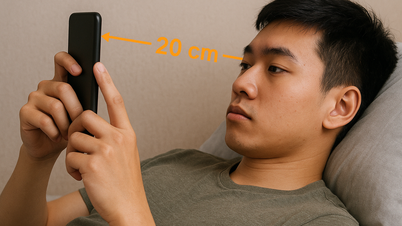A recently published study conducted by a group of experts at Vanderbilt University Medical Center (USA) has discovered that people with poor sleep quality and irregular sleep duration can gradually damage their cardiovascular system and face a high risk of developing heart disease in the future, according to The Healthy website.

People with poor sleep quality and irregular sleep duration can gradually damage the cardiovascular system.
Research team leader, Associate Professor, Dr. Kelsie Full (Vanderbilt University, USA) said: "New findings show that maintaining adequate and regular sleep duration, as well as sleeping at the same time every night, can play an important role in preventing cardiovascular disease."
Dr. Full explains that our bodies are like machines that operate on biological clocks (also known as circadian rhythms). These rhythms regulate countless processes, including sleep, and help the body function in a rhythmic manner. When we disrupt this regularity by altering our sleep schedules, it can cause the body to have difficulty adapting and lead to illness.
“Almost all major cardiovascular functions, including heart rate, blood pressure, vascular tone, and endothelial function, are regulated by the body's natural circadian clock,” says Dr. Full, adding that this is also why poor sleep quality can lead to heart disease.
To ensure quality sleep, the American Academy of Sleep Medicine recommends that people maintain the following habits every night to have healthier sleep, as well as limit the risk of developing heart disease in the future.
- Strive for a consistent sleep schedule, setting a fixed time to go to bed and wake up.
- Aim for 7-8 hours of sleep per night for adults.
- Reserve your bed for rest.
- Make your bedroom a place to relax, limit stressors and distractions such as work…
- Dim the lights as it gets dark to signal your body that it's time to rest. This will help you fall asleep more easily.
- Implement a “digital curfew,” turning off electronic devices at least 30 minutes before bedtime.
Source link



![[Photo] Keep your warehouse safe in all situations](https://vphoto.vietnam.vn/thumb/1200x675/vietnam/resource/IMAGE/2025/10/1/3eb4eceafe68497989865e7faa4e4d0e)
![[Photo] President of the Cuban National Assembly visits President Ho Chi Minh's Mausoleum](https://vphoto.vietnam.vn/thumb/1200x675/vietnam/resource/IMAGE/2025/10/1/39f1142310fc4dae9e3de4fcc9ac2ed0)

![[Photo] Hanoi morning of October 1: Prolonged flooding, people wade to work](https://vphoto.vietnam.vn/thumb/1200x675/vietnam/resource/IMAGE/2025/10/1/189be28938e3493fa26b2938efa2059e)






















































































Comment (0)